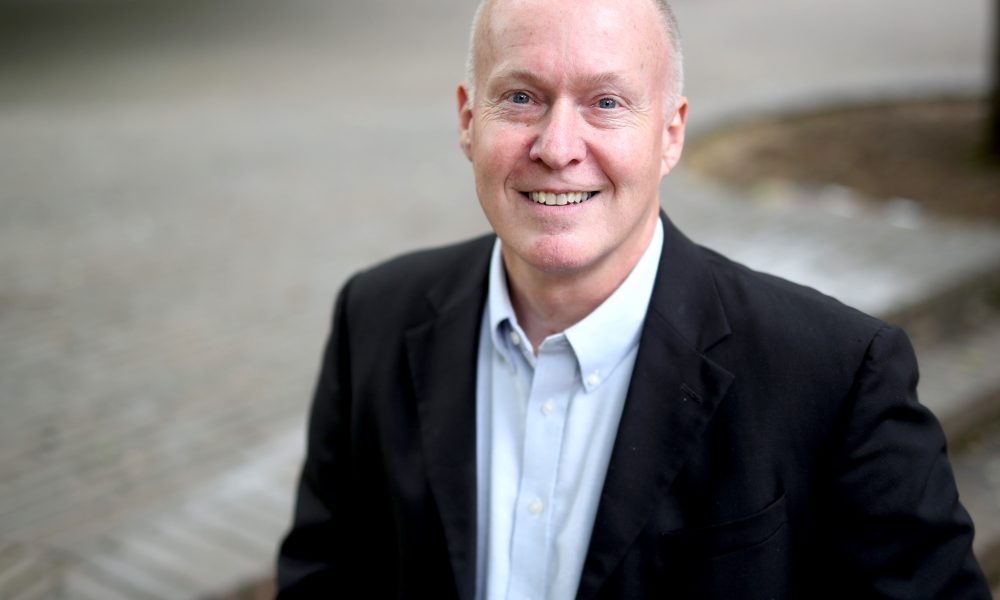
Patrick Starnes, former Independent Party of Oregon candidate for governor, isn’t giving up on his push to reform the flow of political money in the state. (Portland Tribune/Jaime Valdez)
Carpenter Patrick Starnes, former candidate for governor, earns a living now renovating an 1878 house in Brownsville.
In his spare time, he is working to remodel Oregon’s campaign finance laws to cut the influence of major donors.
Limiting campaign money was a primary plank for Starnes as he campaigned for governor last year as the candidate of the Independent Party of Oregon. He took no more than $100 from any single donor though Oregon law would have allowed him to take checks of any size.
Shortly before the election, he dropped out in a deal with Democratic Gov. Kate Brown, getting from her promise to champion campaign finance limits in the 2019 Legislature.
He means to hold her to that promise and is continuing his one-man campaign for reform.
He calls on the governor’s office regularly to check on campaign finance proposals. He’s been assigned a point person in the governor’s office, executive assistant Jack Polales, to meet with weekly.
“The commitment is important to see it through rather than getting the promises from everyone,” Starnes said.
He also shows up at legislators’ offices, sometimes unannounced, with a bright smile on his face and a ready speech on why there should be controls on how much donors can spend on political campaigns.
On Wednesday, for instance, he met individually with Sens. Ginny Burdick, Fred Girod, Tim Knopp and Floyd Prozanski.
“Since I am new to the Capitol, it is more introductory,” Starnes said Friday. “If you haven’t heard about me, this is who I am, and this is what I campaigned on. I want to hear from them mostly what their questions are and what their solutions are.”
Some legislators have already agreed to support a constitutional amendment needed to make limits legal.
“Some lawmakers aren’t interested in it and don’t think it’s a big issue,” Starnes said.
His dream is to limit campaign contributions to $1,000 for individuals and political action committees each election cycle.
In 1997, the Oregon Supreme Court ruled that such limits violated Oregonians’ constitutional right to free speech, but voters could authorize the caps by approving an amendment.
Legislators in each chamber have proposed separate referrals to voters revising different parts of the Constitution. The legislation would let voters decide whether to allow caps but proposes no specific limit.
Currently, donors can give as much as they want.
For instance, former Nike CEO Phil Knight contributed $2.5 million to the campaign of state Rep. Knute Buehler, the Republican nominee challenging Brown. Knight contributed another $1 million to the Republican Governors Association, which itself gave $2 million to Buehler’s campaign.
Those contributions helped make 2018 the most expensive governor’s race in Oregon’s history.
While Starnes is pressing for a $1,000 limit, the governor prefers matching the federal limits of $2,600 per individual and $5,000 per political action committee.
Starnes admitted his number probably won’t appeal to most lawmakers.
“I don’t think it’s viable, but one still has to haggle,” Starnes said.
When Brown testified at the first meeting of the new Senate Committee on Campaign Finance Wednesday, Starnes watched from the audience with his signature smile.
She spoke to kick off the committee’s work on campaign finance legislation.
When the governor entered the meeting, Starnes intercepted her to shake her hand and did the same thing when she left the meeting.
She declared her support for a constitutional amendment and requiring “dark money” groups to disclose the names of their donors. Such groups include political nonprofits that can legally receive unlimited contributions from corporations, unions and individuals and spend it without identifying donors.
“Political interests should be able to speak out publicly but not to be able to disguise their voices and financial interests in the outcome they seek to influence,” Brown said.
In late 2018, Starnes’s mission to reform campaign finance found a nexus with Jeff Golden. Golden, a freshman senator from Ashland, chairs the campaign finance committee.
During his campaign, he vowed not to accept contributions from political action committees to show he wouldn’t be influenced by special interests, according to the Medford Mail Tribune.
Golden said he asked Senate President Peter Courtney to establish the committee, an effort that went hand-in-hand with the governor’s agenda.
“That’s why he says the stars aligned,” Starnes said of Golden. “It’s just like this crazy huge moneyed campaign, me running in it, him running in it. It seems like the public is ready, even across party lines.”
Starnes said he has asked House Speaker Tina Kotek to convene a campaign finance committee in the House but has not received an answer yet.
Starnes said: “The good news is they didn’t say hell no.”
Paris Achen: [email protected] or 503-506-0067. Achen is a reporter for the Portland Tribune working for the Oregon Capital Bureau, a collaboration of EO Media Group, Pamplin Media Group and Salem Reporter.




